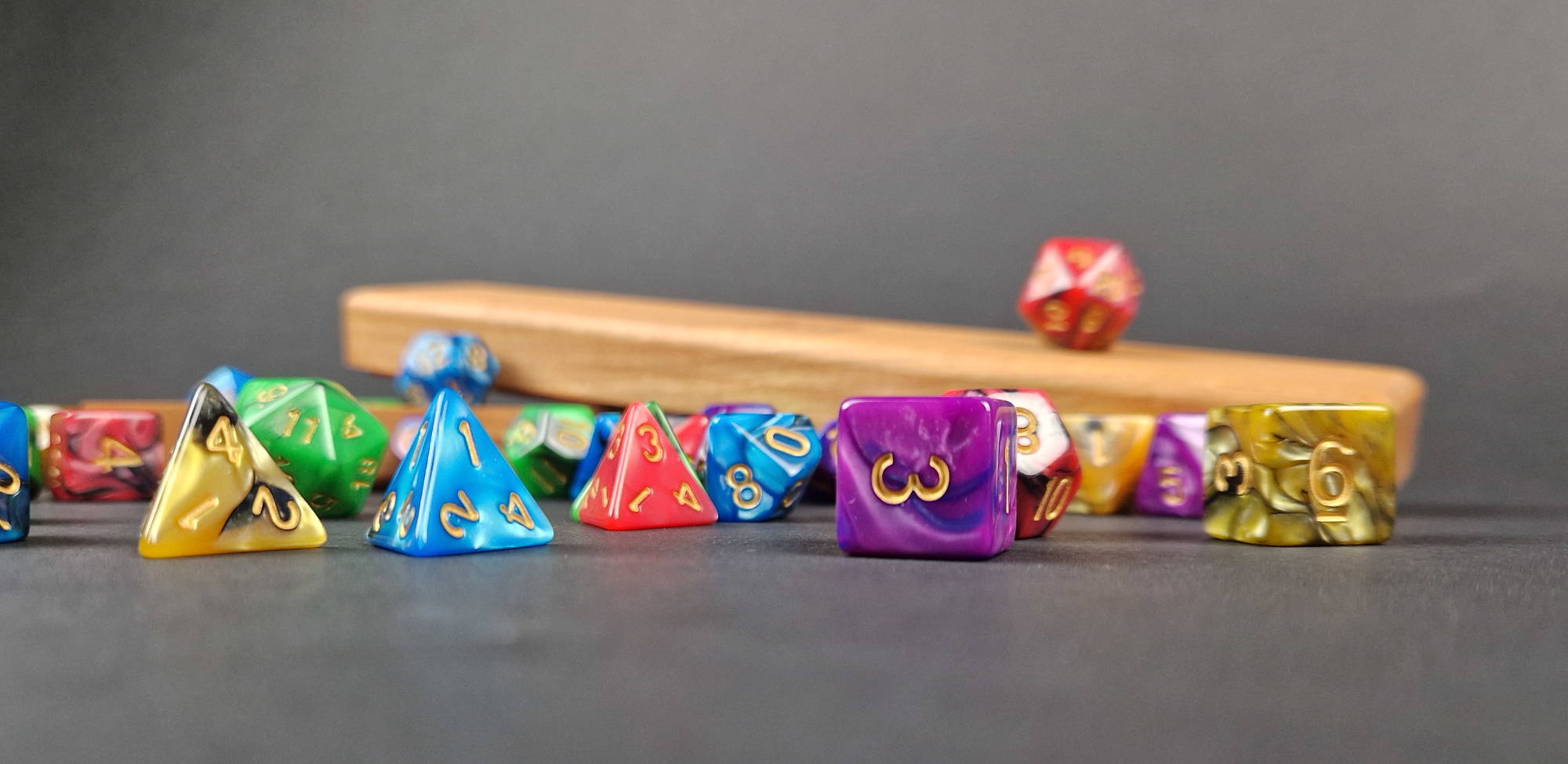Rolling dice in RPGs is how you solve uncertain situations. Does my attack hit? Can I scale the cliff to get to the castle at the top? Did I manage to charm the landlord into letting me stay for free in their tavern? When you roll dice it adds the fun, game element to RPGs.
Rolling dice isn’t always as simple as… well simply rolling them. In the TTRPG and board game communities, people ask why they work the way they do, are they fair, and are there different ways to do so. We look at some of those questions here.
- What is the point of rolling dice?
- Are dice truly fair?
- Is rolling skill or luck?
- Looking for some interesting ways to roll dice?
What is the point of rolling dice?
Any game that involves dice involves chance. Dice are rolled to resolve the element of uncertainty within any of these games. In games with multiple outcomes, rolling dice allows you randomly determine which outcome takes place.
Some games, like Snakes & Ladders rely on the specific use of two 6-sided dice as the core game mechanic – “where did I move to?” Monopoly includes dice to create situations, i.e. they decide where you move and then often something happens that often presents you a choice (buy the property, deal with a player, etc.). RPGs flip that around.
In TTRPGs, dice are designed to resolve uncertainty that the Dungeon Master / Game Master and the players have created. And using different sided dice (polyhedrals – multiple sides) can change the percentage of certain results, which changes the stakes and helps build tension.
But given that the situations in gameplay are created by people and not dice, do you need dice to play? Could you play games like Dungeons & Dragons using only coin flips. You could change all outcomes from a scale to binary. Given that D&D (rules as written) uses set ACs and DCs – what you need to hit or succeed is fixed – the only difference is the percentages. As for rolling damage, something like one hit equals one wound would do it. So what do dice add?
Dice are fun
Dice rolling is something many people have done from a very young age. I defy you to put a set of dice in front of anyone and see them not play, test roll them, etc. I’ve done this at meetings in professional environments! I’ve either had some dice in my bag, or had to bring some to “wargame” a situation, and even the most die-hard “D&D is for nerds” people will give them a roll. Number one: rolling dice is fun!
How do you codify creativity?
Using dice in TTRPGs also gives a numerical value to creative choices. And this fits with how many people actually play the game. Success or failure (outside of combat) isn’t binary, it’s a spectrum. Passing the DC means success, but rolling much higher might mean even more success. This works with “Yes, and…” / “No, and..” / “No, but…” styles of DMing, where the degree to which you succeed or fail affects the outcome.
Assigning modifiers to stats also allows you to meaningfully highlight the differences between characters. If two characters are making the same check but one has a much better modifier, that strengthens the idea that they are different as people. An equal roll on the dice has a different “dirty” result. This system is built upon using dice – you can’t add modifiers to flipping a coin! Games like D&D are about creating characters and celebrating their differences. You’d struggle to achieve the same effect without dice.
Are dice truly fair?
Generally, yes, when you buy dice you can be confident that they are fair. Depending on how well made your dice are there can be very slight variations on different sides. For the most part, this is going to have a negligible effect.
However, if you buy handmade dice, wooden dice, or just aren’t too sure, there is a way to test if your dice are balanced, even if you aren’t Mr Data. It’s actually pretty easy.
Take a glass of water and dissolve enough salt in it so that your dice float (you might struggle with metal dice here). Then pop your dice in and poke them so that they roll in the water. If you get the same number coming up all the time then they aren’t balanced very well. Just please make sure your dice won’t be damaged by being submerged in salt water! And if you prefer video, this guy shows you!
If your dice are not balanced you might have a problem! Unfortunately, unless you’ve got the strength and sensitivity of a super-powered android, then you’re probably not going to be able to use those dice again.
Some dice, like those made from wood, or certain resin liquid-core dice like those with eyes in, may roll differently to normal plastic or resin dice. This is because they might not have a consistent weight and make-up throughout. You might be willing to tolerate that if you’re buying them just for yourself, but it might be worth checking that your fellow players are ok with your dice. And clearly, if you know they’re weighted then don’t use them.
Is rolling skill or luck?
If you’re rolling dice fairly, then rolling dice comes purely down to luck – and that’s the fun of it! Any skill used to influence the fall of the dice is dishonest. And around the game table, whether it is D&D or other RPGs or board games, when you’re playing with your friends. And unless you’re rolling with weighted dice, it can be pretty obvious.
Remember, that in RPGs there are rarely “winners” because it’s not the point of those games, so don’t worry about trying to beat other players. Remember that some of the best situations in the TTRPGs come from when things don’t go to plan. Sometimes even character death leads to some great moments. So don’t try to cheat yourself and others out of some of the core experiences of RPGs.
Looking for some interesting ways to roll dice?
To find out about how to give dice rolling some extra flair, and keep it fair, you should check out our article on how dice towers add value to your game.
If you want the best accessories for rolling dice and protecting your table, shop dice trays and dice towers. And for storing and protecting your dice, we recommend a dice vault.

